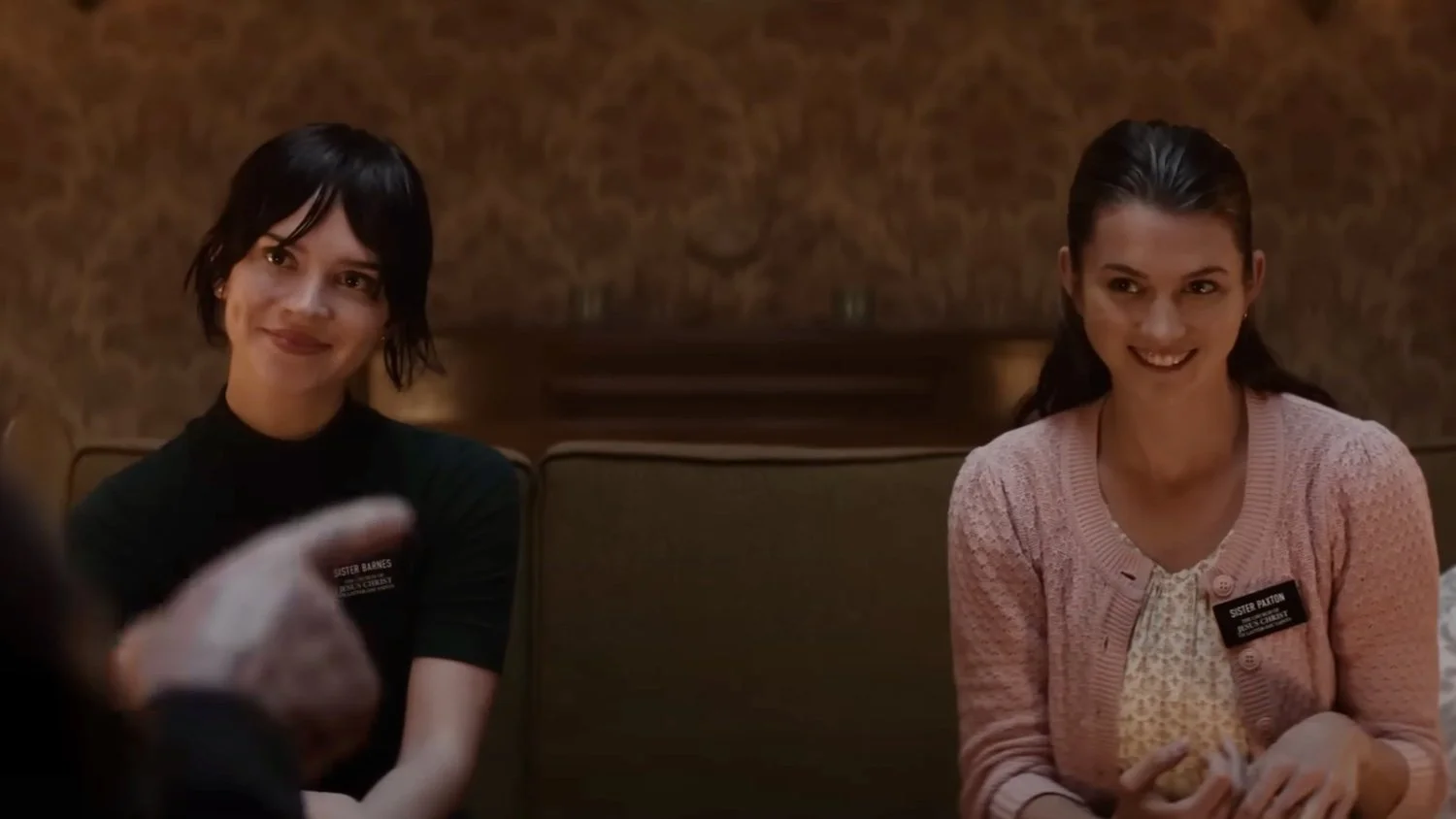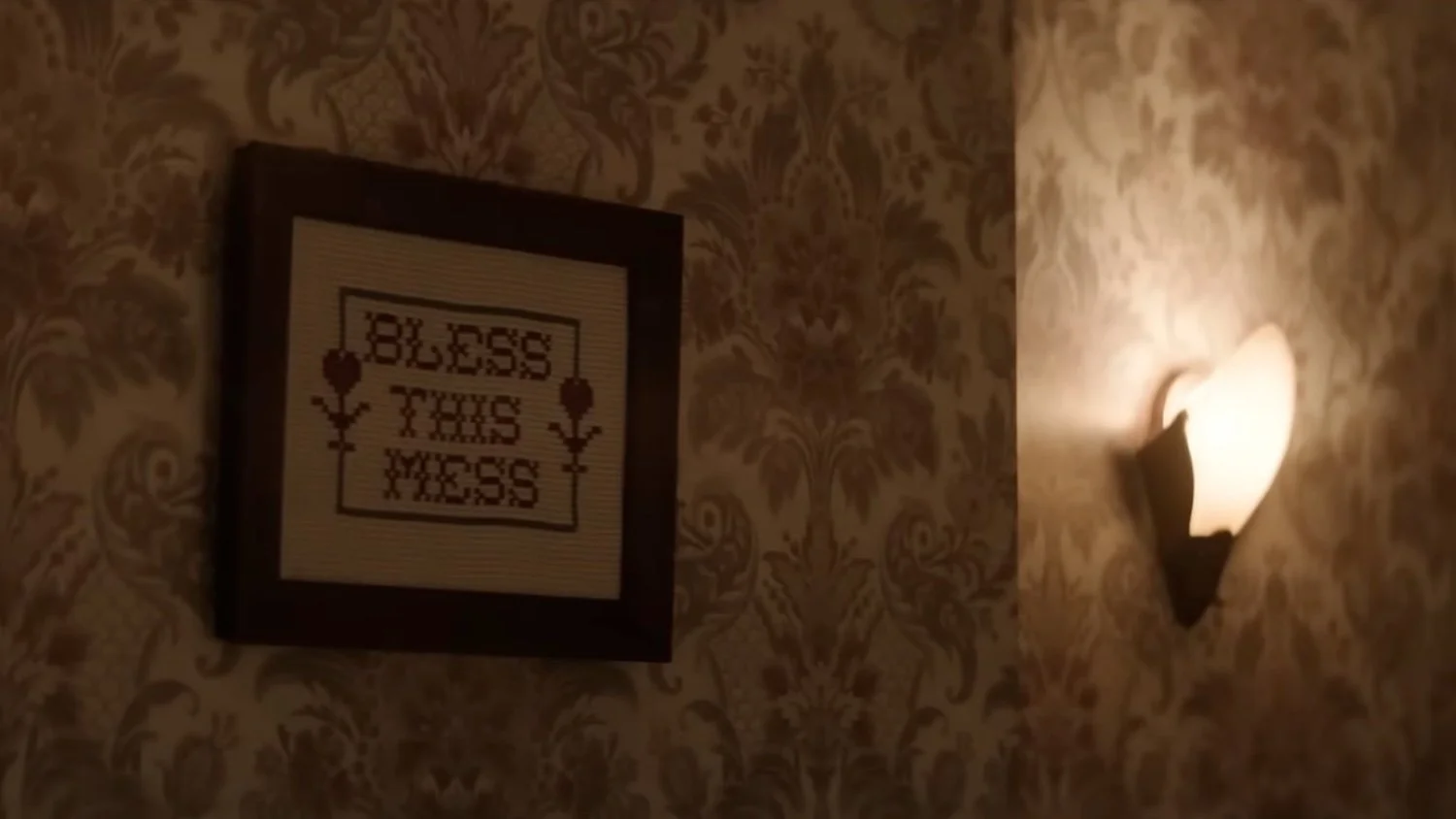‘Heretic’ Undermines Its Compelling First Half by Cribbing Straight From ‘Religulous’
The Plot: Two Mormon missionaries get trapped in a Hugh Grant character’s house as he argues against religion in favor of his own brand of militant atheism.
The Verdict: A24’s Heretic, in theaters today, starts strong, only to get lost in the dark at the end. Sophie Thatcher of Yellowjackets fame is assured in her role as Sister Barnes, while Hugh Grant gives a masterful performance as Mr. Reed that uncovers a layer of menace beneath his bumbling Brit persona. Yet the movie, directed by the writing team of Scott Beck and Bryan Woods (A Quiet Place), is sometimes self-indulgent in its dialogue. There’s a lot of banter about burger chains—with the characters going off on a stagey tangent and name-dropping every major one in the U.S.—but none of it measures up to Pulp Fiction’s “Royale with Cheese” scene.
The movie opens with Sister Paxton, one of the above-mentioned missionaries, played by Chloe East of The Fabelmans, talking about false advertising with condoms. As she does so, she wonders aloud, like a cinephile deceived by a good movie trailer: “What else do we believe just because of marketing?”
Mr. Reed’s Gospel of Iterations, From Mormonism to Radiohead
In his blueberry-pie-scented living room, the first major point Mr. Reed makes is that religions retcon themselves to similarly market themselves better. The example he uses is Mormonism trying to make itself more palatable through a sudden “modern revelation” that would do away with the outdated practice of polygamy. How can we trust divine revelation if it’s filtered through imperfect human vessels like Joseph Smith, who delivered a “Word of God” that conveniently benefitted him and his penchant for plural wives?
Speaking of wives, Mr. Reed uses his own imaginary wife to illustrate a point in his library about Sister Barnes and Sister Paxton “politely indulging a lie.” They go along with what he says about his wife being home even when it doesn’t feel right. In the same way, they believe what they’ve been told—or sold—at church.
It’s an effective, creepy moment when Mr. Reed confronts them with the question, “Do you still believe my wife is in the next room?” The sequence in the library ratchets up the tension as Heretic moves into its second act, and the characters abandon all pretense of polite conversation.
The most interesting part comes when Mr. Reed starts talking about iterations and how ideas recapitulate themselves across time. This goes beyond religion and includes everything from music to board games, with Mr. Reed likening the Abrahamic religions to editions of Monopoly (and the similar Landlord’s Game, which predated it).
As an alt-rock fan who came of age while Radiohead was a critical darling, it floored me to learn via Heretic that the band’s first big hit, “Creep,” sorta-kinda plagiarizes part of the vocal melody and chord progression in the song, “The Air That I Breathe.” I never realized Radiohead was sued for copyright infringement and forced to credit Albert Hammond and his songwriting partner, Mike Hazlewood, as co-writers on “Creep.”
The irony is, the version of “The Air That I Breathe” that we hear in Heretic is itself a cover (done by the Hollies) of the original Hammond song, released two years earlier. By the time we get to Lana Del Rey’s “Get Free” (who Radiohead hypocritically sued for plagiarism, as Mr. Reed notes), we’re dealing with at least the fourth iteration of the same song.
It’s the kind of thing that takes me back to my college days, when I started discovering that every idea I (or my pop-culture idols) had was already conceived by someone else. I jokingly thought of these ideas as “pre-existing rip-offs,” an oxymoronic phrase that neatly encapsulates the futility of debating originality in thought. Maybe there are no truly original ideas, just ones that the most talented innovators manage to execute in a semi-original fashion.
Krishna, Christ, Jar Jar, Horus, and ‘Religulous,’ Reheated
Unfortunately, Heretic isn’t original enough in how it executes its most withering critique of Christianity and other religions. During one of Mr. Reed’s speeches, I began experiencing déjà vu, as if I had heard someone else deliver the same argument before. It turns out I was right, because if you go back and watch the 2008 documentary Religulous, written by Bill Maher (who also stars), there are ideas and even bits of dialogue that Beck and Woods seem to have lifted from Maher. Here’s one example.
Heretic (2024): “Krishna, he was a carpenter, born to a virgin, baptized in a river …”
Religious (2008): “Krishna was a carpenter, born of a virgin, baptized in a river …”
Now, it could just be a coincidence that Heretic lists off the attributes of the Hindu god Krishna in the same order and nearly the exact same wording as Religulous. But for me, the clincher was when Mr. Reed starts making non-sequiturs about Star Wars: Episode I - The Phantom Menace. Religulous also draws a connection between that movie and the Jesus Christ narrative when Maher meets a tourist in Florida’s erstwhile Holy Land theme park. The tourist, doing a much better job than Mr. Reed of explaining the virgin-birth connection, says:
“It’s funny you should bring that up because, of course, in Star Wars: Episode I - Phantom Menace, Anakin [Skywalker] is born to a virgin. And people see that, and they say, wait a second, where have we heard that before? That’s not original.”
Mr. Reed foregoes the clear explanation and instead blurts out Jar Jar Binks nonsense. Now, I know Sophie Thatcher rode with a speeder bike gang in a quasi-biblical-sounding Star Wars show (The Book of Boba Fett), but Jar Jar is a character from a movie that hit theaters before she and Chloe East were even born. If we can assume their characters are roughly the same age as them (24 and 23), and if Mr. Reed is about the same age as Hugh Grant (64), why is he making all these ‘90s pop culture references to Radiohead and Jar Jar and expecting them to understand?
It makes more sense when you realize this movie was written by a couple of 40-year-old guys, who are of a different generation than any of the characters. Maybe that’s why so many of their references land like failed truth bombs in a dorm-room discussion where none of the dudes are as smart as they think they are.
Heretic also claims that the Egyptian god Horus “had twelve disciples” and was “baptized in a river,” just as Maher does in Religulous. The problem is, Maher says Horus was baptized by “Anup the Baptizer, who was later beheaded” à la John the Baptist. However, as Catholic Answers notes in its article, “Cleaning Up the Horus Manure,” the Anup story and the assigning of twelve disciples to Horus were later inventions of an amateur Egyptologist who lived in the 19th century. Religulous itself appears to have just been parroting some claims made in 2007’s straight-to-YouTube, conspiracy-theory-laden documentary, Zeitgeist.
As Mr. Reed, the monologuing villain, sprinkles in ahistorical bits of information like this from his Religulous cheat sheet, we get the sense that the writers of Heretic are just repeating false claims from another movie. It comes off like they’re about 20 years late to the New Atheism movement, simply using Hugh Grant as the mouthpiece for their own Diet Bill Maher ideas. It’s like, “Yeah, thanks, guys, I read The God Delusion, too.”
At one point, Mr. Reed goes full Scrooge, dinging Christmas by repeating the Religulous observation that there were other gods before Christ born on December 25th. The thing is, as Live Science points out, no one knows the date when Jesus Christ was actually born. The commercial holiday of December 25th began as a church tradition, not in a Bible as the Word of God.
The film raises these points in service of the idea that “missionaries are just salespeople for an organization,” and, “The holy texts which we revere are just mythological iterations of stories which ancient people have been telling each other for centuries.” But movies are no different, and I’m not sure plagiarizing an anti-religious movie is the best way to make your point about the unoriginality of any religion.
Mormons vs. the Mansplainer: Whoever Wins, We Lose
When I say Heretic gets lost in the dark at the end, I mean that both visually and narratively. Once it descends into Mr. Reed’s shadowy basement, this becomes a much less interesting cinematic exercise. Sister Barnes strategizes how to intellectually spar with Mr. Reed, telling Sister Paxton, “He doesn't have to steamroll us.” But the movie enables him to do exactly that.
As much as I appreciate Sister Barnes coming to the defense of Judaism (which even Mr. Reed is forced to admit “is the OG monotheistic religion,” despite being a minority), it doesn’t negate his overarching point about religion when she brings up the Holocaust. Yet that’s the best counterpunch she manages to land, philosophically, in an otherwise lop-sided screen debate. Sister Paxton also begins acting out of character in the third act, making an admission that betrays the script’s lack of conviction in the Mormon side of the argument.
For his part, Mr. Reed goes to such extreme lengths to make his point that it’s as if the writers have engineered a plot device of Rube Goldberg proportions. I see it as something akin to the elaborate timed lock on Mr. Reed’s front door, which is hidden behind a light switch. It’s the kind of contraption that leaves the viewer thinking, “We’re meant to believe he orchestrated all that?”
The answer, of course, is, “No, the screenwriters orchestrated all that,” doing so in a rather heavy-handed manner. Sure, religion can just be a “system of control,” like they say, but so can audience manipulation, even when it’s badly done and leaves the viewer to fill in gaping plot holes on their own. If only Heretic had done a little less mansplaining and a little more balancing of Mr. Reed’s perspective with that of Sister Barnes and Sister Paxton (whose rebuttals aren’t strong enough or long enough to refute his evil-genius soliloquies).
As a viewer, I can get on board with the notion that “the ideas of others have influenced every single decision you’ve made since the day you were born.” What I can’t get on board with is a movie written by two guys who use two gals as their protagonists, only to let another guy wipe the floor with them in a debate before killing one or more of them in his basement.


